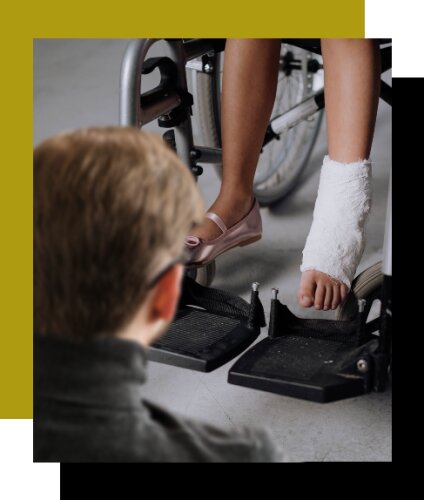Best Toxic Mold Lawyers in Chico
Share your needs with us, get contacted by law firms.
Free. Takes 2 min.
List of the best lawyers in Chico, United States
About Toxic Mold Law in Chico, United States
Toxic mold refers to specific types of mold that can grow in damp, humid, or water-damaged environments and produce toxic compounds known as mycotoxins. In Chico, United States, concerns about toxic mold typically arise in residential and commercial buildings where water intrusion or moisture problems exist. Mold exposure can cause a range of health symptoms, from mild allergies to serious respiratory issues. Legal concerns often involve disputes between tenants and landlords, home buyers and sellers, or renters and property management companies. Toxic mold law deals with who is responsible for mold remediation, disclosure, and damages resulting from exposure or property loss.
Why You May Need a Lawyer
There are several situations in which a person in Chico might seek legal advice or representation concerning toxic mold:
- Health issues caused by mold exposure in a rental property, workplace, or purchased home
- Disputes with a landlord or property manager regarding necessary repairs or mold remediation
- Property damage or financial losses due to delayed maintenance or undisclosed mold
- Disagreements during real estate transactions if mold is discovered post-sale
- Insurance claim disputes related to mold damage coverage
- Failure to disclose mold in commercial or residential property contracts
A lawyer can help you understand your rights, negotiate settlements, file lawsuits, and ensure responsible parties are held accountable.
Local Laws Overview
Chico falls under the jurisdiction of California state laws, which address toxic mold in several key ways:
- Habitability Standards: California law requires residential properties to be safe, habitable, and free from dangerous health conditions. Mold is considered a threat to habitability.
- Disclosure Requirements: Sellers, landlords, and property managers have a legal obligation to disclose known mold problems during real estate transactions or renting processes.
- Repair Obligations: Landlords must address water leaks or sources of moisture promptly and remediate mold as needed to maintain habitable living conditions.
- Tenant Rights: Tenants may have the right to withhold rent, pay for repairs and deduct from rent, or break leases without penalty in some circumstances when mold makes a property uninhabitable.
- California Toxic Mold Protection Act: This law outlines guidelines for identification, remediation, and exposure limits for mold, and tasks public health agencies with providing information and standards.
Chico may also have municipal codes or local ordinances that supplement these protections, though most rules are established at the state level.
Frequently Asked Questions
What is considered toxic mold in Chico?
Toxic mold refers to molds that produce mycotoxins, such as Stachybotrys chartarum (commonly known as black mold). However, any mold growth in a property that causes health issues can be legally significant.
Is my landlord required to fix mold in my apartment?
Yes. By California law, including Chico, landlords must maintain habitable housing. This means responding to reports of leaks, moisture, and mold promptly and efficiently.
Can I sue a former landlord for mold-related health problems?
Potentially. If you can prove that your health was harmed due to exposure to mold and that the landlord knew or should have known about the problem but failed to act, legal action may be possible.
What should I do if I discover mold in my rental property?
Document the mold with photos and written records, notify your landlord in writing, and allow reasonable time for them to address the issue. If they do not act, you may have additional legal rights under state law.
Are landlords required to disclose previous mold problems?
Yes. California law requires landlords and sellers to disclose known mold issues that could affect the property’s condition or occupant safety.
Does my insurance cover mold damage?
Insurance coverage varies. Some policies may cover mold if it results from a covered peril, such as a burst pipe, but often exclude long-term moisture or maintenance issues. Check with your insurance provider.
How is mold removal performed?
Mold remediation must be thorough, addressing both visible mold and the moisture source causing it. Professional services may be required in significant cases to ensure safety and compliance.
Can I break my lease if the property has toxic mold?
If mold makes a rental unit uninhabitable and the landlord does not fix the problem within a reasonable time, you may, under certain circumstances, have the right to break the lease without penalty.
Are there health agencies in Chico that can inspect for mold?
While local health departments may offer guidance, mold inspections are often performed by private certified inspectors. Chico’s local public health agency can provide recommendations.
What evidence do I need for a legal case about toxic mold?
Useful evidence can include photographs, repair requests, professional inspection reports, medical records documenting mold-related health effects, and communication records with landlords or property sellers.
Additional Resources
If you are dealing with toxic mold issues in Chico, the following agencies and organizations can provide guidance or assistance:
- Butte County Public Health Department - environmental health services and information
- California Department of Public Health - Mold Information Line and educational materials
- California Department of Consumer Affairs - tenant and landlord legal guidance
- Legal Services of Northern California - free or low-cost legal help for qualifying individuals
- Local certified mold inspectors and remediation specialists
These resources can assist with complaints, inspections, and understanding your rights and options.
Next Steps
If you believe you have a toxic mold problem in Chico and need legal help, here are the steps you should consider:
- Document all evidence of mold, water leaks, property damage, and health effects.
- Notify the responsible party (landlord, property manager, seller) in writing and keep records of all correspondence.
- Contact health or housing authorities if you suspect a significant habitability or safety issue.
- Consult with a local attorney experienced in toxic mold cases. Prepare your documentation and describe the issue clearly.
- Assess your legal options, which may include negotiation, mediation, or filing a lawsuit if necessary.
An experienced local lawyer can guide you through your rights, responsibilities, and help you achieve a satisfactory resolution. Acting promptly and preserving all evidence will strengthen your case.
Lawzana helps you find the best lawyers and law firms in Chico through a curated and pre-screened list of qualified legal professionals. Our platform offers rankings and detailed profiles of attorneys and law firms, allowing you to compare based on practice areas, including Toxic Mold, experience, and client feedback.
Each profile includes a description of the firm's areas of practice, client reviews, team members and partners, year of establishment, spoken languages, office locations, contact information, social media presence, and any published articles or resources. Most firms on our platform speak English and are experienced in both local and international legal matters.
Get a quote from top-rated law firms in Chico, United States — quickly, securely, and without unnecessary hassle.
Disclaimer:
The information provided on this page is for general informational purposes only and does not constitute legal advice. While we strive to ensure the accuracy and relevance of the content, legal information may change over time, and interpretations of the law can vary. You should always consult with a qualified legal professional for advice specific to your situation.
We disclaim all liability for actions taken or not taken based on the content of this page. If you believe any information is incorrect or outdated, please contact us, and we will review and update it where appropriate.









